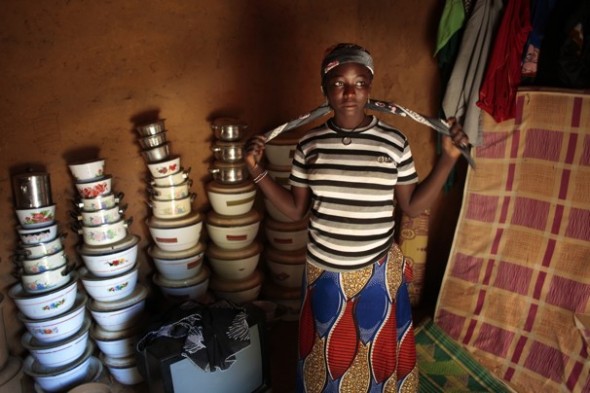September 29th, 2012

In July, Sadiya Oumarou, 15, originally from Hawkantaki, poses in her bedroom in the remote village of Tabouka, Niger. Photo: Jerome Delay/AP
Already beset with a severe hunger crisis, the West African nation of Niger is now grappling with the worst flooding in 80 years.
At least a half-million people have been displaced, according to the aid agency Oxfam, and cholera rates are expected to rise. More than 80 people have died in the floods, said officials of the United Nations.
The rains, which were essential to help a nation that has suffered droughts in 2005, 2010 and this year, have destroyed thousands of acres of crops, hurting thousands of desperate families.
“Although rain is needed, this year’s excessive rains have destroyed thousands of houses and farmland, and families already struggling to survive have lost everything,” Samuel Braimah, country director for Oxfam in Niger, said in a statement. “These floods were the last thing the country needed.”
The youngest in this country of 16 million people are being hit the hardest: According to UNICEF, 1 million children in the Sahel region of West Africa are facing life-threatening malnutrition this year, and a third of them live in Niger.
Schools in the capital, Niamey, are providing shelter to flood victims. That has postponed the start of the school year for thousands of students, according to Oxfam.
Meanwhile, the drought continues to affect more than 5.5 million people in Niger — and 18 million across the Sahel region.
Both UNICEF and the World Health Organization are warning that cholera rates could spike as the floods exacerbate conditions, namely poor sanitation and hygiene practices, which help spread the disease. Emergency cholera levels have already been declared in western Niger, as well as in Liberia, Sierra Leone, Guinea and Congo.
The humanitarian concerns are dovetailing with regional woes.
Niger and other countries in the area are under pressure from the insecurity in neighboring Mali, where al-Qaeda-linked Islamists have taken over the northern part of the country. More than 260,000 refugees have fled to Mali’s neighbors, including Niger, straining their fragile economies. The region already suffers from high poverty levels and has one of the lowest human development levels in the world, according to the United Nations.
“Political turmoil, extreme climatic conditions and fragile economies are combining to create a perfect storm of vulnerability,” U.N. Secretary-General Ban Ki-moon said at a meeting on the Sahel region this week at the 67th U.N. General Assembly in New York.
“Terrorist groups, transnational criminal organizations and insurgencies threaten peace and prosperity,” he said. “There is a particularly disturbing rise in extremism, and human rights abuses are prevalent. Human trafficking is on the rise, along with drug trafficking and arms smuggling.”
Source: The Washington Post

Leave a Reply